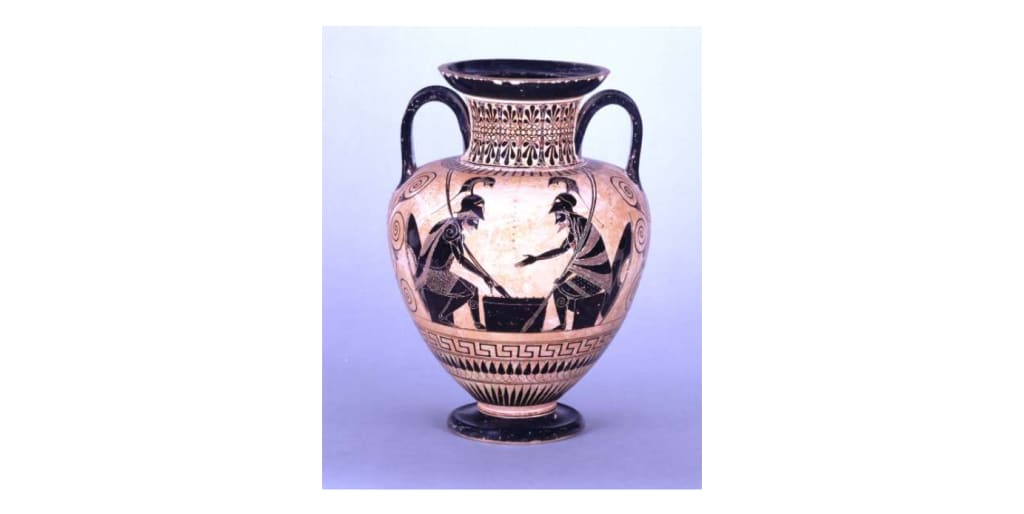Art that Speaks: Achilles and Ajax playing pessi, Lysippus Painter
An educational showcase utilizing historical fiction

Content Warning: depictions of grief in the second story.
-----------------------------------------
Ajax thought a moment, holding a pebble between his fingers. He shifted the spear in his other arm instinctually as he scanned the board.
"Stumped, cousin?" Achilles asked, smiling.
"No, no," said Ajax, "just surveying the battlefield."
Achilles slouched forward, gesturing to his various stones, "Take your pick of targets! I know where I would move that one..."
Ajax looked sidelong at his cousin with reciprocal taunting, and chuckled, "Ah, Achilles the Tactician! I did not know that was your new title! Odysseus might have a word or two to say..."
Achilles snorted, "I am not playing with Odysseus, I am playing you, second best of the Achaeans!"
"Very funny, cousin..." Ajax said trailingly.
Ajax slid the pebble forward, capturing one of Achilles'.
"... but there are one or two things we are more than equal in. Pessi, for example..." Ajax continued, a devilish smile pursing his lips.
Achilles' smile faded. He immediately grabbed one of his pieces and slid to capture the one Ajax just moved. His smile renewed as Ajax looked displeased.
Then, Ajax's feigned frown suddenly turned back into a smirk as he immediately moved another pebble and captured two of Achilles' own simultaneously.
"You are a mighty warrior, dear cousin, but you are always on the attack." Ajax said.
"Oh, spare me your nonsense," Achilles said as he slid another of his stones, capturing two of Ajax's, "a good offense can do wonders."
Ajax cocked his head to the side. Achilles leaned forward, a proud gleam in his eyes. The two young men then leaned back and laughed.
The sounds of war were distant in this moment of joy.
-----------------------------------------
"Did you bring it, Phesu?" the woman asked.
"Yes, Mother," he replied, holding the amphora aloft, careful not to spill its contents.
Thupeltha gently took the vessel from her son and inspected it.
"Fine craftsmanship indeed. This is... Ajax and Achilles?"
"I thought Dad would have appreciated it." Phesu said.
Thupeltha raised an eyebrow, knowing well enough her son would continue after a pause.
"Dad was a great warrior, young and taken too soon. That and this scene reminds me of when we used to play that game together."
Thupeltha nodded, remembering those moments well. She then looked at the fresh frescoes on the tomb walls around them: scenes of life, hunting, swimming, banqueting. She noticed a fine likeness of him and her sitting side-by-side at the head of the table. She smiled as a tear fell on her dress. Phesu noticed and embraced her. He wept as well.
"A fine choice," she said, wiping her eyes.
Though, as she did, Thupeltha reread the inscription, "What is this.... 'Lysippides kalos' ... 'Lysippides is beautiful'?"
She looked to her son, who shrugged.
He replied, "I have no idea, the Athenian merchant who sold it to me said it was second hand. I didn't think it mattered, it was more the image I was going for..."
Thupeltha smiled as she had a strong idea who had this made this for 'Lysippides'.
She laughed, "Ah, the Athenians are so strange! Your father would appreciate the humor."
Thupeltha and Phesu chuckled exhaustedly and placed the amphora in an appropriate place within the tomb.
-----------------------------------------
While the previous stories are fiction, they are inspired by the story of this amphora in the British Museum. While amphora were typically used for storage for wet and dry goods, decorated black-figure amphorae, such as Athens was known for, were either used as prizes in athletic competitions or as burial goods. This particular amphora was found in an Etruscan tomb outside the Italian town of Chiusi. Athenian black-figure pottery was a status symbol in ancient Etruria, and Etruscan tombs are renowned for containing complete and near complete Greek pottery.
Black-figure amphora almost always contain narrative scenes, often of myths and stories. The Iliad, the Odyssey, and other works within the Epic Cycle are common subjects.
Dedications to men using the word "kalos" (beautiful) are also incredibly common on these vessels, as male beauty and athleticism were prized and relationships between men commonplace in ancient Greece.
Moreover, I found it prudent to portray this scene in an Etruscan tomb as funerary studies are among the most human of anthropological studies in my opinion. Our ability to love, grieve, and honor the memory of our loved ones is central to our humanity and features within the crucial study of death and death culture. And here is the gratuitous shout-out t0 all my funerary archaeology friends. You guys are the best!
If you would like to continue learning about this vessel and the Lysippides Painter, might I suggest:
This artifact's catalogue entry on the British Museum's website
A short educational video on the artifact by the British Museum
About the Creator
Enjoyed the story? Support the Creator.
Subscribe for free to receive all their stories in your feed. You could also pledge your support or give them a one-off tip, letting them know you appreciate their work.






Comments (3)
I really enjoyed this story! I found myself getting lost in the tale and the characters -- and your writing style is fantastic! Excellent imagery; also crisp and clean. Well done, Ian! :)
It is fun to image what might have been, the conversations that may have been had. I enjoyed this.
Man this is great. Anything that humanizes history contains a wonderful quality all its own, let alone the fantastic prose.